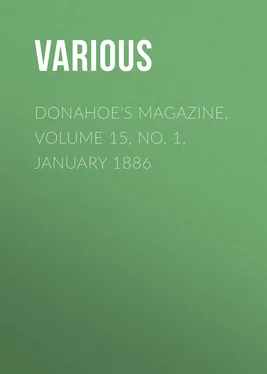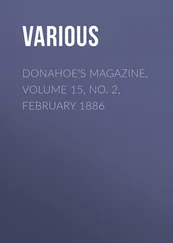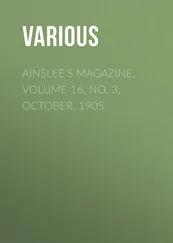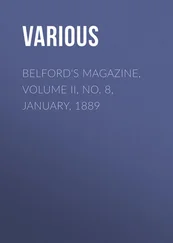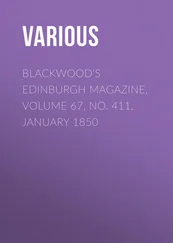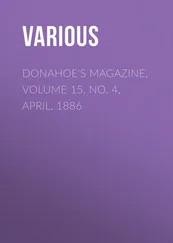Various - Donahoe's Magazine, Volume 15, No. 1, January 1886
Здесь есть возможность читать онлайн «Various - Donahoe's Magazine, Volume 15, No. 1, January 1886» — ознакомительный отрывок электронной книги совершенно бесплатно, а после прочтения отрывка купить полную версию. В некоторых случаях можно слушать аудио, скачать через торрент в формате fb2 и присутствует краткое содержание. Издательство: Иностранный паблик, Жанр: foreign_antique, periodic, foreign_edu, на английском языке. Описание произведения, (предисловие) а так же отзывы посетителей доступны на портале библиотеки ЛибКат.
- Название:Donahoe's Magazine, Volume 15, No. 1, January 1886
- Автор:
- Издательство:Иностранный паблик
- Жанр:
- Год:неизвестен
- ISBN:нет данных
- Рейтинг книги:3 / 5. Голосов: 1
-
Избранное:Добавить в избранное
- Отзывы:
-
Ваша оценка:
- 60
- 1
- 2
- 3
- 4
- 5
Donahoe's Magazine, Volume 15, No. 1, January 1886: краткое содержание, описание и аннотация
Предлагаем к чтению аннотацию, описание, краткое содержание или предисловие (зависит от того, что написал сам автор книги «Donahoe's Magazine, Volume 15, No. 1, January 1886»). Если вы не нашли необходимую информацию о книге — напишите в комментариях, мы постараемся отыскать её.
Donahoe's Magazine, Volume 15, No. 1, January 1886 — читать онлайн ознакомительный отрывок
Ниже представлен текст книги, разбитый по страницам. Система сохранения места последней прочитанной страницы, позволяет с удобством читать онлайн бесплатно книгу «Donahoe's Magazine, Volume 15, No. 1, January 1886», без необходимости каждый раз заново искать на чём Вы остановились. Поставьте закладку, и сможете в любой момент перейти на страницу, на которой закончили чтение.
Интервал:
Закладка:
Young McCloskey returned to the home of his mother in Westchester County, N. Y., and looked forward to his future career in life. As often happens, a family bias, or wish, rather than the judgment of the young man himself, induces the first step. John McCloskey was to become a lawyer. We are told that he began the study of Coke and Blackstone, of the principles of law and the practice of the courts, in the office of Joseph W. Smith, Esq., of New York. But the active mind was at work solving a great problem. A fellow-student at college, his senior in years, brilliant, poetic, zealous, had resolved to devote his life and talents to the ministry, and had more than once portrayed to young McCloskey the heroism of the priestly life of self-devotion and sacrifice. The words of Charles C. Pise and his example had produced an impression greater than was apparent. McCloskey meditated, prayed and sought the guidance of a wise director. Gradually the conviction became deep and firm that God called him to the ecclesiastical state. He closed the books of human law, renounced the prospects of worldly success, and resolved to prepare by study and seclusion, by prayer and self-mastery, for the awful dignity of the priesthood.
The next year he returned to Emmittsburg to enter the seminary as a candidate for holy orders from the diocese of New York. He was welcomed as one whose solid learning, brilliant eloquence, deep and tender piety, studious habits and zeal made it certain that he must as a priest render essential service to the Church in this country. As a seminarian, and, in conjunction with that character, as professor, he confirmed the high opinion formed of him, and at an early day Bishop Du Bois fixed upon him as one to fill important positions in his diocese.
From the moment that he took possession of his See the Rt. Rev. Dr. Du Bois had labored to give New York an institution like that which he had brought to so successful a condition in Maryland, reckoning as nought the advance of years and the heavy duties of the episcopate. It was not till the spring of 1832, that he was able to purchase a farm at Nyack, in Rockland County, as the site for his seminary and college. To preside over it, he had already selected his seminarian, John McCloskey, whom he summoned from Emmittsburg. The visitation of the cholera, however, prevented the progress of the undertaking, although the school was opened. The corner-stone was laid on the 29th of May, 1833, and the erection of the main building was carried on till the second story was completed, when the bishop appealed to his flock to aid him by their contributions.
On the 24th of January the old Cathedral in New York witnessed the solemn ceremony of an ordination, and the Rev. John McCloskey was raised to the dignity of the priesthood. The young priest was stationed at Nyack; but his eloquent voice was heard and appreciated in the churches of New York City. The first sermon which the young priest preached after his ordination is an index of the piety and devotion which guided him through life. It was on devotion to the Blessed Virgin, and was delivered in the church reared in New York in honor of the Mother of God.
In the summer of 1834, the little chapel at Nyack, adjoining the rising college, was ready for dedication; but before the institution could be opened, the virulent declamations of a Brownell had inflamed the minds of the ignorant peasantry in that neighborhood with religious hatred, and the college was denounced as an evil to be prevented. The torch of the incendiary soon laid the edifice in ashes.
The project of a seminary and college was thus indefinitely deferred, although Bishop Du Bois, with characteristic determination, resolved to rebuild the blackened ruins and raise the college anew. So confident was he of success, that he would not appoint Rev. Mr. McCloskey to any parochial charge, reserving him to preside over the diocesan institution on which he had set his heart. In order to fit himself for the position, the young priest begged his bishop to permit him to proceed to Rome in order to follow for two years the thorough course of theological studies in the Gregorian University, thus profitably employing the time that would necessarily be required to fit the institution for the reception of pupils.
As Bishop Du Bois saw the wisdom of the suggestion, he consented, and early in 1835 Rev. John McCloskey reached the Eternal City, and enrolled himself among the distinguished pupils like Grazrosi, Perrone, Palma, Finucci, who were then attending the lectures of Perrone, Manera, and their associate professors. One who knew Rome well, and knew the late Cardinal well, wrote: "What advantage the young American priest drew from them has ever since been seen in the remarkable breadth and correctness and lucidity of his decisions in theological matters, whether coming before him in his episcopal duties, or brought up for discussion in the episcopal councils which he has attended. His words, calm and well considered, have ever been listened to with attention, and generally decided the question. But, beyond the mere book learning, so to speak, of ecclesiastical education, he gained a knowledge of the ecclesiastical world, nowhere else attainable than in Rome. Brought in contact with the students of the English College, under Dr. (afterwards Cardinal) Wiseman, of the Irish College under Dr. (afterwards Cardinal) Cullen, of the Propaganda under Monsignor (afterwards Cardinal) Count de Reisach, of the Roman Seminary, and of other colleges, he came to know many brilliant young students of various nationalities, alike in faith and in fervent piety, yet dissimilar in the peculiar traits of their respective races. He formed friendship with many who have since made their mark in their own countries. The young American priest, so polished and gentlemanly in his address, so modest and retiring, and yet so full of varied learning, so keen of observation, and so ready, when drawn out, with unexpected and plain, common-sense, home thrusts, was fully appreciated among kindred minds of the clergy of Rome, and of other countries visiting Rome. Though avoiding society as far as he could, and something of a recluse, he was welcome in more than one noble Roman palace. But it was especially in the English-speaking circle of Catholic visitors each winter to Rome, that he was prized. Cardinal Weld, ever an upholder of Americans, anticipated great things yet to be done by this young priest, and loved to present him to the Cliffords, the Shrewsburys, and other noble English-speaking Catholics, as a living refutation of the accounts of Americans and American manners, just given to the English world by Mrs. Trollope."
Among this English-speaking colony in Rome he found abundant occasion for the exercise of his ministry, such was the confidence inspired by his piety and learning. Among those placed under his direction was Mrs. Connolly, an American convert, who, in time, founded in England a teaching community of high order, the Sisters of the Holy Child Jesus, which has now many houses in England and the United States.
At the expiration of the time assigned for his studious sojourn in Rome, Rev. Mr. McCloskey left the Eternal City, well fitted, indeed, to assume the directorship of the seminary. He travelled with observant eye through Northern Italy, Austria, Germany and France, then crossed to the British Isles, visiting England and Scotland. His tour enabled him to meet old friends and to win new ones; as well as to learn practically the condition of the church in all parts of Europe.
When he returned to New York in 1838 he found that Bishop Du Bois had, overcome by difficulties and trials, finally abandoned his projected seminary; and now desired to assign him to parochial work. With the well-trained priest to hear was to obey. Yet the position of the bishop was one of difficulty. An uncatholic national feeling had been aroused some years before in New York, assuming under Bishop Connolly all obsequiousness to that prelate and zeal for his honor; under Bishop Du Bois its whole power was wielded against him; and as few of the leaders in the movement were practical Catholics, appeals to their religious sense fell unheeded.
Читать дальшеИнтервал:
Закладка:
Похожие книги на «Donahoe's Magazine, Volume 15, No. 1, January 1886»
Представляем Вашему вниманию похожие книги на «Donahoe's Magazine, Volume 15, No. 1, January 1886» списком для выбора. Мы отобрали схожую по названию и смыслу литературу в надежде предоставить читателям больше вариантов отыскать новые, интересные, ещё непрочитанные произведения.
Обсуждение, отзывы о книге «Donahoe's Magazine, Volume 15, No. 1, January 1886» и просто собственные мнения читателей. Оставьте ваши комментарии, напишите, что Вы думаете о произведении, его смысле или главных героях. Укажите что конкретно понравилось, а что нет, и почему Вы так считаете.
